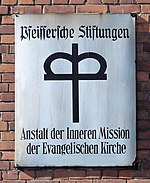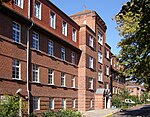Pfeiffer foundations
| Pfeiffer foundations | |
|---|---|
| place | Magdeburg |
| Coordinates | 52 ° 6 ′ 57 ″ N , 11 ° 40 ′ 0 ″ E |
| Care level | Standard supply |
| beds | 121 |
| areas of expertise | 10 |
| founding | 1889 |
| Website | [1] |
The Pfeiffer Foundations in Magdeburg , founded in 1889 by Superintendent Gustav Adolf Pfeiffer , are one of the traditional diaconal complex institutions in Saxony-Anhalt and are among the larger diaconal companies in Germany. Two hospitals, outpatient and inpatient housing offers for people with mental and multiple disabilities are just as much a part of it as a workshop for disabled people, nursing homes and outpatient services, inpatient and outpatient hospice work and a social pediatric center jointly with Caritas . Together with the Magdeburg Clinic , the Pfeiffer Foundations are responsible for an education center for health professions in Magdeburg (founded in 2014).
structure
The foundations operate a wide range of medical and nursing facilities. In detail these are
- Health sector (Clinic in the Pfeiffer Foundations, Lung Clinic Lostau, Medical Care Center of the Pfeiffer Foundations)
- Aid for the disabled with the areas of living and working, an integration society and an outpatient clinic; Job offers for people with mental illnesses are made in the PRW.
- Care for the elderly (inpatient and outpatient services)
- Palliative and hospice center
- Education center for health and care professions
- Service company of the Pfeiffer Foundations
status
The foundations are organized as a “mild foundation under civil law”, have the status of a legal person and are tax-privileged. One sees oneself as part of the Evangelical Church in Central Germany and is a member of the Diakonisches Werk Mitteldeutschland . The foundations are represented by the full-time executive board, which consists of the chief executive officer and the commercial executive board. The board of trustees with a minimum of 7 and a maximum of 12 members is the highest body of the foundations and oversees the board of directors. The Pfeiffer Foundations have parochial rights .
history
The foundations were established on October 20, 1889 under the name "Evangelisches Johannesstift" for the care of the elderly by the Evangelical superintendent Gustav Adolf Pfeiffer . Another task of the monastery was day care for children. In addition, the “Dorotheenhaus” was opened in 1891 for mentally handicapped children. A men's nursing home followed in 1893. In 1895 the German Kaiser granted the institution the rights of a legal person.
In May 1899, the Samaritan Church, the "Samaritan House" and three other houses were inaugurated. The Samaritan House was intended to care for the physically handicapped. In 1900, at Pfeiffer's invitation, the first deaconesses from Wroclaw came to the foundations as trial sisters. After the cooperation had proven itself, the "Deaconess Mother House in the Pfeiffer Foundations" was created for the deaconesses working in the foundations. The foundations have borne the name of their founder since August 28, 1902, and thus during Pfeiffer's lifetime, and are called “Pfeiffer Foundations in Magdeburg-Cracau”. On July 1, 1908, the status of an independent parish was given. Pfeiffer's successor was Pastor Martin Ulbrich. Under his direction, a craftsmen's home for apprentices with physical disabilities was built in 1914. In 1926/1927 the "Bethesda" house was built for women in need of care. In the same year the "Luisenhaus" was built as a hospital for the residents and employees.
In a bomb attack on January 21, 1944, the buildings of the foundations, such as the "Samaritan House", suffered considerable destruction. The church was hit so badly that it was threatened with demolition. After the war, however, it could be rebuilt with our own efforts and was reopened on Reformation Day, October 31, 1949. At the height of the crisis between the Protestant Church and the rulers in the GDR at the beginning of the 1950s, the foundations were expropriated and placed under the management of the City of Magdeburg under accusations of neglect and illegal employment of the mentally handicapped people later proven to be false. After sharp protests by the Magdeburg church leadership, the expropriation was reversed. On February 1, 1955, the two deaconess sororities active in the foundations merged to form the "Diakonissenanstalt Bethanien".
After the relationship between state and church had relaxed at the end of the 1970s, the structural expansion could begin. In addition to the already existing orthopedic clinic, there were also clinics for internal medicine, gynecology and surgery. As part of the specialization of the hospitals in Magdeburg, the Clinic for Gynecology and Obstetrics was closed in 1987.
After the political change in 1989 and the restoration of German unity in 1990, all housing options for old people and people with disabilities were considerably expanded. The old buildings were completely renovated, new ones - also outside the grounds of the Pfeiffer Foundations - were erected.
In 1994 the construction of a new hospital began, and by 2001 a functional wing, two ward blocks and the new construction of the orthopedic clinic were added. On January 1st, 1996 the Lung Clinic Lostau - until then owned by the state of Saxony-Anhalt - was taken over.
In 2012, under the patronage of the Prime Minister of Saxony-Anhalt, Reiner Haseloff , the foundation stone was laid for the first inpatient children's hospice in Saxony-Anhalt and opened on March 6, 2013 in his presence.
Personalities
- Otto Perl , founder of the Self-Help Association for the Physically Disabled, lived on the property of the foundations from 1934 to 1943
- Kurt August Koelsch , surgeon, after 1947 temporarily medical director of the foundations
- Gustav Kleff , gynecologist and obstetrician, established a gynecological and obstetric department at the foundations on April 1, 1947, which existed until 1987
- Martin Stahn , archivist, worked as secretary for the foundations from 1900 to 1902
- Friedrich Peter , theologian, pastor and bishop, worked as an assistant preacher in the foundations in the 1920s
- Johannes Jänicke , pastor and bishop, buried in 1979 in the cemetery of the Pfeiffer Foundations (his wife died in 1965 and was also buried here)
- Karl Hüllweck , pastor and writer, buried with his wife in 1994 in the cemetery of the Pfeiffer Foundations
literature
- Andreas Riemann, Linda Stieffenhofer, Michael Kamp: 125 years of the Pfeiffer Foundations - for the glory of God and for the sake of people, August Dreesbach Verlag, Munich 2014.
Web links
Individual evidence
- ↑ Articles of Association of the Pfeiffer Foundations in Magdeburg-Cracau from June 26, 2009








